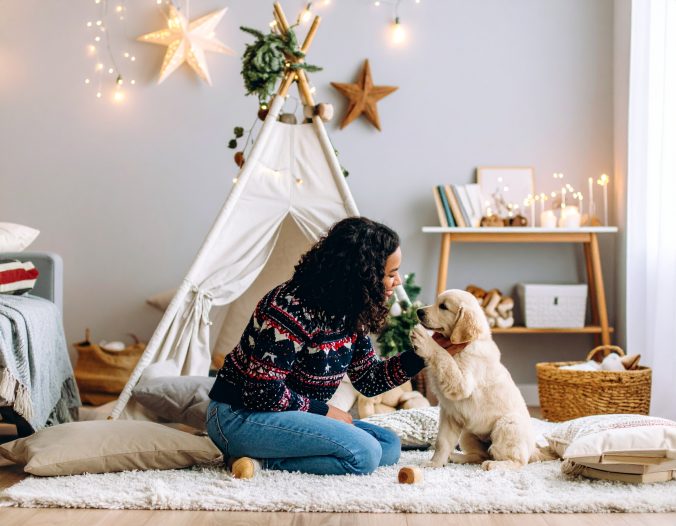Bringing home a puppy for the first time? It’s exciting, chaotic, and (let’s be honest) a little overwhelming. The first month is when you set the foundations for training, socialisation, and a happy life together.
If you’re a first-time puppy owner, these 10 essential tips will help you survive those early weeks and build a great relationship with your new furry friend.
1. Puppy-Proof Your Home
Before your new puppy sets paw inside, do a safety sweep. Hide electrical cords, secure bins, keep toxic plants and cleaning products out of reach, and put away anything you don’t want chewed.
(Coming soon: [Our full guide to puppy-proofing your home])
2. Create a Safe Puppy Space
A crate or playpen can be a lifesaver for new owners. It gives your puppy a cosy, secure place to rest and keeps them out of trouble when you can’t watch them. Add a soft bed, safe chew toys, and a blanket that smells like you to help them settle.
3. Stick to a Consistent Routine
Puppies thrive on routine. Set regular times for feeding, toilet breaks, play, and naps. This makes them feel secure and makes toilet training far easier.
4. Begin Toilet Training Immediately
Take your puppy outside frequently — especially after meals, naps, and playtime — and reward them the moment they go. Positive reinforcement works wonders; avoid punishment as it can cause fear and confusion.
(Coming soon: [Step-by-step toilet training guide for puppies])
5. Provide Plenty of Chew Toys
Puppies explore with their mouths. Offer plenty of safe chew toys to protect your furniture (and fingers!). Rotating toys every few days keeps things interesting.
6. Start Socialisation Early
Once your vet gives the go-ahead, gently introduce your puppy to new people, places, sounds, and other dogs. Proper puppy socialisation helps prevent fear and behavioural issues later in life.
7. Focus on Positive Training
Keep training sessions short (5–10 minutes) and fun. Reward with treats, toys, and praise. Start with basic commands like “sit,” “stay,” and “come.” At this stage, you’re building trust as much as teaching commands.
(Coming soon: [Beginner’s guide to puppy training])
8. Book a Vet Check-Up
Your first month should include a vet visit for vaccinations, a health check, and advice on flea/worm prevention. Bring any questions you have about feeding, growth, or behaviour — it’s a great time to get professional reassurance.
9. Ease Night-Time Whining
Sleeping alone can be scary for a new puppy. Try placing their bed or crate near your room at first for comfort. Gradually move them to their permanent spot once they’re more settled.
10. Be Kind to Yourself
New puppy care can be exhausting! Take breaks when you can, ask for help, and celebrate small wins (like the first successful toilet trip outside). Remember — this stage doesn’t last forever.
FAQs: First-Time Puppy Owner Questions
How often should I take my puppy outside for toilet breaks?
At least every 1–2 hours during the day, and always after meals, naps, or playtime.
When should I start training my puppy?
Right away! Even young puppies can learn simple commands like “sit” and “come.”
When can my puppy go outside for walks?
Usually after their vaccinations are complete (your vet will advise), but you can start early socialisation by carrying them outdoors to get used to sights and sounds.
The First Month is Just the Beginning
Being a first-time puppy owner can feel overwhelming, but with patience and consistency, you’ll soon find your rhythm. These early weeks are all about building trust, teaching good habits, and creating a lifelong bond with your dog.
Looking for more advice? Explore PetTown for upcoming guides on puppy training, crate setup, socialisation, and first-year essentials.


Leave a Reply